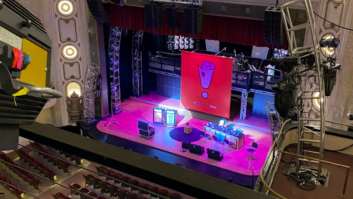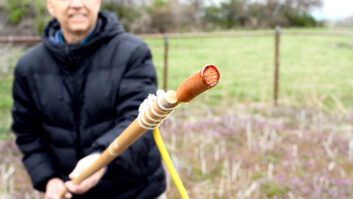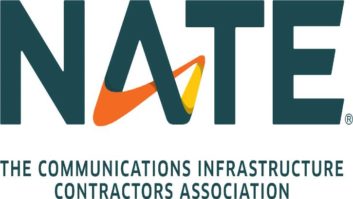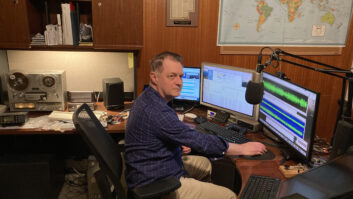
Morgan is shown with other NRSC leaders on the day he stepped down as chairman in 2007. From left: Milford Smith, Mike Bergman, Charlie Morgan and Andy Laird. Photo courtesy Milford Smith.
Charlie Morgan died this weekend, as we reported Tuesday.
Radio World asked Milford Smith, Morgan’s successor as chairman of the National Radio Systems Committee, to share his thoughts.
Yes a very sad day for those of us who both knew Charlie and those who greatly benefited from his expertise and industry leadership.
Although Charlie is best remembered for his long time chairmanship of the NRSC, he should also be equally remembered for what he accomplished in his “real job” as the leader of the Susquehanna Radio engineering effort. Susquehanna was always known as among the very best “engineered” companies in the radio business, and it was because of Charlie’s great knowledge, equally great expertise, hiring skills and management acumen that the company achieved that status.
At one point I had the opportunity to see many of the Susquehanna facilities close up in a due diligence exercise. The one word that comes to mind was “impressive.” They were among the very finest facilities in every market in which they operated, and their technical personnel were likewise exceptional.
Much of my close association with Charlie occurred in the NRSC. Charlie was the chairman and I was the DAB subcommittee chairman during the era in which various digital radio systems were developed, tested and ultimately evaluated by the NRSC.
Those were exciting and, what many may not realize, very contentious times. Multiple proponents were actively and aggressively seeking NRSC approval of their systems, and many NRSC meetings had more attorneys than engineers in attendance. We moved the process forward while figuratively negotiating a legal minefield, not to mention developing and then making a challenging technical evaluation of systems never envisioned, let alone tested before.
The key to the eventual success of the process and the eventual development of a U.S. digital radio standard was Charlie’s no-nonsense stewardship and his amazing political skills. Charlie was as good a negotiator and persuader as he was an engineer. The ultimate consensus agreement of the NRSC to adopt the (then) iBiquity IBOC system, was largely due to Charlie’s off-the-record efforts to bring the various parties together. It was quite an accomplishment!
I recall a few “after NRSC” meetings with Charlie in the lounge of the Mayflower Hotel. He taught me a lot about negotiation and politics as we speculated as to how we would ever get to the other side of the always highly charged digital radio debate!
I was honored to follow Charlie as NRSC chairman. I tried to convince him to stay on, but, true to form, Charlie’s mounting health issues forced him to miss a few meetings, and he felt that he could not in good conscience continue as chairman given the circumstances. That was in 2007. Charlie attended every meeting he possibly could after stepping down and was active for many years in the NRSC’s many subcommittees.
The industry has lost a talented engineer — someone who was largely responsible for the next generation of radio in the U.S. — and a great colleague and friend to everyone who knew him. That included a lot of people. He will be greatly missed both professionally and personally. They don’t make ’em like Charlie anymore.
You can use the Disqus tool below to post your own comments on this or any story.












